Heal Surname Ancestry ResultsOur indexes 1000-1999 include entries for the spelling 'heal'. In the period you have requested, we have the following 165 records (displaying 141 to 150): Single Surname Subscription | | | Buying all 165 results of this search individually would cost £924.00. But you can have free access to all 165 records for a year, to view, to save and print, for £100. Save £824.00. More... |
These sample scans are from the original record. You will get scans of the full pages or articles where the surname you searched for has been found. Your web browser may prevent the sample windows from opening; in this case please change your browser settings to allow pop-up windows from this site. Boys entering Sherborne School
(1946)
The grammar school at Sherborne in Dorset, which doubtless existed from the creation of the diocese of Sherborne in 705, was refounded by king Edward VI in 1550. At the quatercentenary in 1950, a fourth edition of the Sherborne Register was published, listing boys entering the school during those four centuries. In truth, the materials for this register survive but fitfully before 1823; for some years, no names are known; sometimes all that is known is a surname. But from 1823 onwards the lists and the details get steadily more comprehensive. By the 20th century the boys are listed alphabetically by surname under term of entrance. Surname is given in bold, then christian names, name of father (surname and initials) and address; year of birth; house (a, School House; b, Abbey House; c, The Green; d, Harper House (formerly The Retreat); f, Abbeylands; g, Lyon House; h, Westcott House); whether represented the school at cricket (xi), football (xv), shooting (viii), &c.; year of leaving; summary of degrees, career &c.; and (in italics), address as of 1950. Names in the early lists marked with an asterisk are found inscribed on the oak panelling or on the stone walls of the former schoolroom. (F) in the lists indicates a foundationer, receiving free education: after 1827, when this privilege was restricted to boys from Sherborne and neighbourhood, nearly all foundationers were day-boys.HEAL. Cost: £4.00.  | Sample scan, click to enlarge
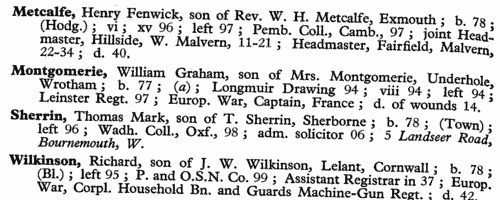
| Doctors in London
(1948)
The Medical Directory was split into several sections. The London section covered all medical practitioners resident within the London postal district. Each year a schedule was sent to each doctor to be returned to the publishers, so as to keep the directory up to date. In the directory the doctor's name is given first, in bold, surname first, in capitals; then current address. Next are the qualifications; the italic abbreviations in parentheses following the qualifications indicate the medical school at which they were gained. Then there is a list of posts and honours within the profession, starting with those then current; previous posts are preceded by the word 'late'. Finally, brief details are given of any publications.HEAL. Cost: £2.00.  | Sample scan, click to enlarge
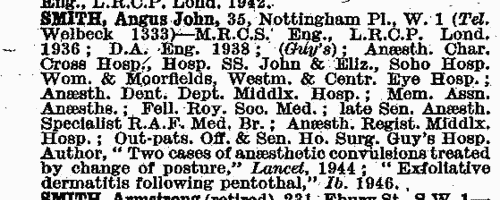
| Imperial Service Medal
(1949)
The Central Chancery of the Orders of Knighthood at St James's Palace announced these awards by king George VI of the Imperial Service Medal to members of the Home Civil Service. The names are arranged alphabetically by surname (in capitals) and christian names, with office or rank in the service.HEAL. Cost: £4.00.  | Sample scan, click to enlarge
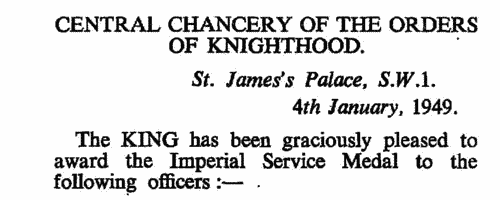
| Prominent Inhabitants of Birmingham
(1949)
The Birmingham Post Year Book and Who's Who is an annual publication seeking to give comprehensive information about the city's organizations and its eminent residents. The Year Book has separate sections dealing with the City Council; the Municipal Elections; Municipal Departments; The High Court of Justice; Members of Parliament for the City; Political Associations; Government Departments; Trade and Industry; Birmingham Consular Association; Banks and Branches; Birmingham Stock Exchange; Restaurants and Cafes; Health; Churches and Religious Congregations; Freemasons; Education; Child Care; Youth; Cultural Activities; British Broadcasting Corporation; Sports and Pastimes; Philanthropic and Kindred Institutions; County and Kindred Societies; International Societies; United Nations Association; Clubs; Transport; The Forces; Toc H.; Royal Antediluvian Order of Buffaloes; Electricity and Gas Boards; Law List; Chartered Accountants; Incorporated Accountants; Certified and Corporate Accountants; Chartered Secretaries; Surveyors, Auctioneers, Land Agents and Valuers; Architects; Civil Engineers; Mechanical Engineers; Electrical Engineers; and Old Boys' Associations. For most organizations, names and addresses of secretaries and other officers are given. Full lists of professional people are given in their sections, with addresses. Then there is the Who's Who in Birmingham, which (with an In Memoriam section for those who had died in the last year) usually gives full name (surname first, in capitals, in bold), date and place of birth (and often father's name), if married the year and name of spouse (and sometimes father's name); numbers of sons and daughters; a brief description of career, recreations, and current address.HEAL. Cost: £6.00.  | Sample scan, click to enlarge
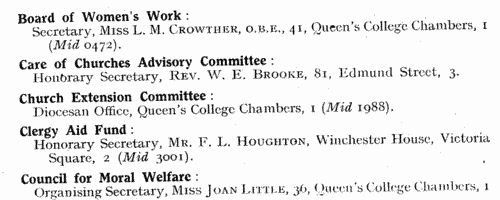
| Boys entering Sherborne School
(1950)
The grammar school at Sherborne in Dorset, which doubtless existed from the creation of the diocese of Sherborne in 705, was refounded by king Edward VI in 1550. At the quatercentenary in 1950, a fourth edition of the Sherborne Register was published, listing boys entering the school during those four centuries. In truth, the materials for this register survive but fitfully before 1823; for some years, no names are known; sometimes all that is known is a surname. But from 1823 onwards the lists and the details get steadily more comprehensive. By the 20th century the boys are listed alphabetically by surname under term of entrance. Surname is given in bold, then christian names, name of father (surname and initials) and address; year of birth; house (a, School House; b, Abbey House; c, The Green; d, Harper House (formerly The Retreat); f, Abbeylands; g, Lyon House; h, Westcott House); whether represented the school at cricket (xi), football (xv), shooting (viii), &c.; year of leaving; summary of degrees, career &c.; and (in italics), address as of 1950. Names in the early lists marked with an asterisk are found inscribed on the oak panelling or on the stone walls of the former schoolroom. (F) in the lists indicates a foundationer, receiving free education: after 1827, when this privilege was restricted to boys from Sherborne and neighbourhood, nearly all foundationers were day-boys.HEAL. Cost: £4.00.  | Sample scan, click to enlarge
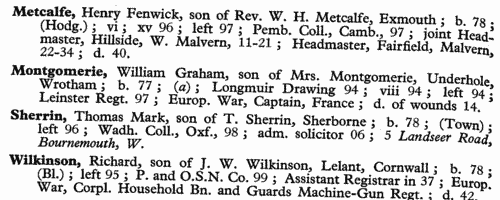
| Chemists
(1950)
The Royal Institute of Chemistry was founded in 1877, and was open only to British subjects (and also, in due course, to citizens of the newly-created Republic of Ireland). Associates of the institute (A. R. I. C.) qualified either by studying chemistry, physics, mathematics and an optional science for the institute's examination (which insisted on a high standard of practical laboratory efficiency); or by obtaining good honours degrees or equivalent qualifications, with chemistry as principal subject, and having undergone training in allied sciences. Associates of at least three years' standing could then be admitted to the Fellowship (F. R. I. C.) either by taking a further examination in a special branch of chemistry, or by submitting the results of work or evidence of experience sufficient to justify the Council in granting exemption from such further examination. This register of fellows and associates, correct to 31 August 1950, contains 11,545 names, arranged alphabetically, surname first (in capitals), with qualifications, current address, telephone number, and (in italics) a brief description of present post in the chemical industry. Finally, year of admission as associate (A.) (and, where appropriate, fellow (F.) is given on the right-hand side. With this may appear the notation (x) for a fellow of the Chemical Society, (y) for a member of the Society of Chemical Industry, or (z) for a joint subscriber to all three chartered bodies.HEAL. Cost: £4.00.  | Sample scan, click to enlarge
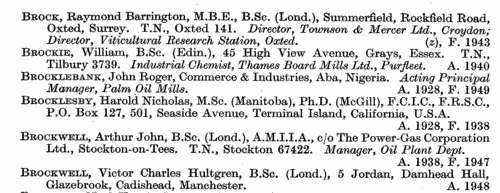
| Estates of the Deceased: Notices under the Trustee Act
(1950)
Under the Trustee Act 1925 s. 27, notices were gazetted giving the names of deceased (surname first, in capitals); address, description, and date of death; names, addresses and occupations of persons to whom notices of claims against the estate were to be given, and names (in brackets) of personal representatives; and the date on or before which notices of claim were to be given. January 1950.HEAL. Cost: £4.00.  | Sample scan, click to enlarge

| Chartered Electrical Engineers (M. I. E. E. and A. M. I. E. E.)
(1951)
The Institution of Electrical Engineers was founded in 1871 under the name of The Society of Telegraph Engineers, and incorporated by royal charter in 1921. This list of members, corrected to 2 July 1951, gives the names and addresses of the Members (M. I. E. E.) and Associate Members (A. M. I. E. E.), all of whom were entitled to describe themselves as Chartered Electrical Engineers. The names are given in bold, surname first; before each name is the year of attaining the grade of Associate Member (AM) or Member (M); and, before the address, the year of reaching each lower grade is also given, e. g. (G. 1931), G standing for Graduate, S for Student. Where the engineer was also a member of one of the institution's specialized sections, this abbreviation is given, in bold: M, Measurements Section; R, Radio Section; S, Supply Section; U, Utilization Section.HEAL. Cost: £4.00.  | Sample scan, click to enlarge

| Owners and Breeders of Friesian Cattle
(1951)
The British Friesian Cattle Society registered the pedigrees of pure Friesian cattle in the United Kingdom. This list of members is corrected to 10 April 1951, and gives full name (surname first), address, and where the member owned a herd, the prefix attributed to that herd. A dagger in front of an entry indicates that the herd was attested. HEAL. Cost: £4.00.  | Sample scan, click to enlarge

| Electrical Engineers
(1952)
The Institution of Electrical Engineers was founded in 1871, and incorporated by royal charter in 1921. There were seven grades of member (honorary member, member, associate member, companion, associate, graduate, and student); this is the list of the 19,699 members of the latter three grades as of 1 July 1952. Most of the members were from Britain, but there were Oversea Branches for Calcutta, Ceylon and Ireland, and Oversea Committees in Australia, India, Malaya and Singapore, New Zealand and South Africa. The associates (A), graduates (G) and students (S) are listed together in a single alphabetical list by surname and christian name(s), with year of entering the grade. Some of the members also belonged to specialized sections of the institution, and these are indicated at the right by the letters M (measurements), R (radio), S (supply) and U (utilization).HEAL. Cost: £4.00.  | Sample scan, click to enlarge
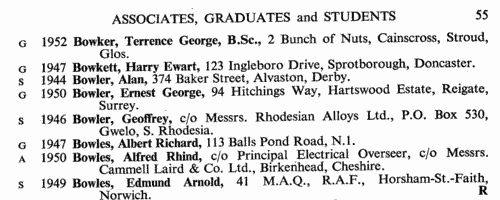
|
Research your ancestry, family history, genealogy and one-name study by direct access to original records and archives indexed by surname.
|












